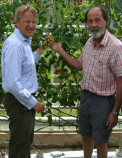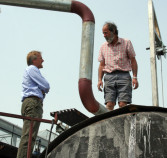Political Lobbying
The Association were delighted to welcome Charles Walker MP to a members Tomato Nursery in Hertfordshire recently.
Charles was provided with a guided tour of the Nursery by John Jones (Guy & Wright) & chairman Gary Taylor and briefed on the challenges facing the Protected horticulture industry at present.
The lack of light in the first few months of the season affected the development of fruit. This had been compounded by low early prices compared to previous seasons.
Parliamentary Questions
The chairman and secretary have met with Conservative MP Charles Walker on several occasions and on their request a question was tabled in the House of Commons on the 17th February this year.
Charles Walker (Broxbourne, Conservative) asked
To ask the Secretary of State for Business, Innovation and Skills what progress has been made on establishing a body to monitor and enforce the groceries supply code of practice; and if he will make a statement.
Edward Davey (Parliamentary Under Secretary of State (Employment Relations, Consumer and Postal Affairs), Business, Innovation and Skills; Kingston and Surbiton, Liberal Democrat) replied
The Groceries Code Adjudicator Bill is currently being drafted. The aim is to publish the draft Bill around Easter, allowing time for pre-legislative scrutiny. The Bill will be introduced as soon as parliamentary time allows.
BBC Radio Interview
The Lea Valley growers speak to Charlotte Smith
Lee on Radio 4.mp3
MP3 audio file [6.5 MB]
"Charlotte Smith from the BBC Farming today programme visited Abbey View Nursery and interviewed members on the difficulties faced with planning and expansion in the Lea Valley.
Brian Hibberd (Managing director of Abbey View Nursery) described how neighbouring land owners were holding onto plots with hope value for residential development, whilst Franco Pullara (Managing Director of Coronation Nursery) explained how the local planning system had let him down as his application for an Anaerobic Digester had been refused whilst an application for a care home on land designated for horticultural use had been approved by local planners.
You can hear the interviews in full by clicking on the MP3 icon. or by visiting the BBC Farming today website or on the BBC Iplayer".
MP fights for cucumber growers
Published on 10 June 2011
HARLOW MP Robert Halfon has asked the Government to help with the crisis hitting cucumber growers in the Lee Valley, and across the UK.
Following the E-Coli outbreak in Germany, sales of British cucumbers have fallen by 30 to 50 per cent, even though UK produce is perfectly safe.
Mr Halfon is campaigning for compensation for the farmers, from the 150 million Euro fund announced by the European Commission, an end to Russian sanctions against British produce, as cucumbers grown here are perfectly safe, and a communication campaign from the Government, reassuring the public that our cucumbers are safe to eat.
Mr Halfon has also spoken personally with the Farming Minister, Jim Paice MP, about the plight of small farms and pack-houses in his constituency in the last few days.
When Mr Halfon raised this in Parliament, the Government's reply had some glimmers of hope, as the Leader of the House, Sir George Young, promised to take forward the question of compensation for farmers that have lost their livelihoods.
Mr Halfon later said: "Since the crisis broke I have been in regular contact with the Ministerial team in DEFRA, and I know they are pushing hard to protect British interests at the European level. As we speak, Lord Henley is at an emergency agriculture council in Luxembourg on this very subject.
"But we must do more. The European Commission has proposed giving at least 150 million Euros in compensation to the farmers hit by this deadly outbreak. We must redouble our efforts, to ensure that British farmers get their fair share of this aid."
He added: "Secondly, many large countries such as Russia have used this crisis not just to ban imports of German cucumbers, but to impose heavy trade embargoes on British produce as well, even though our cucumbers are perfectly safe. That's why I have asked the Government to pressure Russia to lift their unfair ban.
"Finally, I would urge the Government to continue reassuring the public. Supermarkets and shoppers need to hear that British cucumbers are safe, and that this Government is standing four-square behind our local farmers at this difficult time.
"On Saturday I will be meeting with many cucumber growers and businesses from the Roydon and Nazeing area of my constituency, to hear their problems and see if I can help."
European Protest
in 1981 it was discovered that the Dutch Glasshouse growers were receiving subsidised rates for their gas from the Dutch Government giving them a considerable advantage over English Growers and in contravention of the competition rules of the treaty of Rome.
The Lea Valley Growers Association took four coach loads of members to Brussels and joined with other growers from diferent parts of the UK to make their protest felt.
Members held placards with the slogans "If it's Dutch, Don't Touch" and "Cheap Dutch Gas kills British growers".
The protest was ultimately successful and the subsidy was removed.
LVGA Response to EFDC Lea Valley Glasshouse Survey 2011
The Lea Valley Growers Association is a specialist branch of the National Farmers Union and represents over 90% of the growers located within the Lea Valley.
The Lea Valley produces over 80 million Cucumbers per annum along with other salad produce such as Peppers, Tomatoes, Aubergines & Lettuce and exceeds a farm gate income of £75m.
The NFU represents 55,000 farm businesses in England and Wales and exists largely to promote the sustainable development of British agriculture & Horticulture.
Increasing production of British food under glass carries a variety of benefits, including reducing environmental damage associated with importing fresh produce, using inputs (such as water) more efficiently and having a greater degree of control over non-food outputs.
Developments such as those proposed in the Lea Valley will help to further these benefits.
Recent planning decisions made by EFDC indicate that planning members are not following policy and do not understand the issues faced by modern horticulture and are not following the recommendations of their own planning officers.
It is also evident that planning officers are not correctly interpreting their own policy with recommendations for refusal based upon inaccurate interpretations.
I recently sat in a meeting with a planning officer who had rejected an application for an AD plant due its visual appearance, however, when questioned further admitted that he had not read the Environmental impact study fully or looked at the photographs provided with the study and was sceptical of all studies submitted with planning applications.
Regretfully the Association maintains a cautious stance towards this survey in light of recent planning decisions and interprets these decisions as negative towards the future expansion and viability of the Lea Valley glasshouse industry.
Proposals to install modern energy and heat infrastructure, in the form of an anaerobic digestion plant & Combined Heat & Power, demonstrates a commitment by Lea Valley Growers to reducing energy use and recognition of the environmental benefits, in particular reduced greenhouse gas (GHG) emissions, associated with this kind of technology.
This kind of proactive approach will contribute to the UK cutting its GHG emissions by 80% within the next forty years, as required under the 2008 Climate Change Act.
Defra's Food 2030 report, published earlier this year, set out the Government's vision for a sustainable and secure food system for 2030.
The strategy is structured around six core issues for the food system, four of which are clearly supported by proposals in the Lea Valley:
o Ensuring a resilient, profitable and competitive food system
o Increasing food production sustainably
o Reducing the food system’s greenhouse gas emissions
o Reducing, reusing and reprocessing waste
"Since 2007, the NFU has led the joint agricultural Climate Change Task Force in recognising the many opportunities for agriculture and land management to tackle climate change, and in developing a Greenhouse Gas Action Plan for our sector.
We have submitted robust responses to government consultations on its Renewable Energy Strategy and incentive schemes for renewable electricity and heat.
A substantial low-carbon contribution is expected from the many forms of bio-energy, much of which can be supplied from within the agricultural sector.
It is the NFU's stated aspiration that all farmers and growers should have the opportunity to diversify their businesses and create 'green' jobs by supplying renewable energy services. Farmers have always produced both food and non-food outputs, and we do not see any conflict between our contribution towards both food security and energy security.
The NFU has been closely involved in the development of successive policies on anaerobic digestion (AD) and Combined Heat & Power (CHP).
We support the current Coalition Government aspiration for a 'huge increase' in energy from AD, and have played a prominent role in the development and delivery of the 2011 AD Strategy.
The NFU developed the ambition, shared with many other organisations, of deploying 1000 farm-based anaerobic digesters by 2020, delivering multiple environmental benefits including low-carbon energy, abatement of greenhouse gas emissions and stimulation of good nutrient recycling.
In 2010 the Lea Valley Growers Association were named as stakeholders by the London Assembly for their consultation into the promotion of commercial food growing in London.
The Mayor recommended that the local plan should specifically state that food growing is one of the most beneficial land uses in the green belt and include a requirement for boroughs to give added weight to food growing as one of the most productive activities in the green belt when preparing policies for their local development frameworks.
The Essex Rural Commission report 2009 recommended the launch of an Essex food policy that will set out, among other things, how local authorities and other public sector bodies can support local businesses.
The NFU & The Lea Valley Growers Association strongly supports the recommendation of projects for planning approval in respect of renewable energy installations and Glasshouse development - in order to sustain rural jobs, diversify the local economy, and contribute towards national goals for renewable energy and greenhouse gas reductions."







